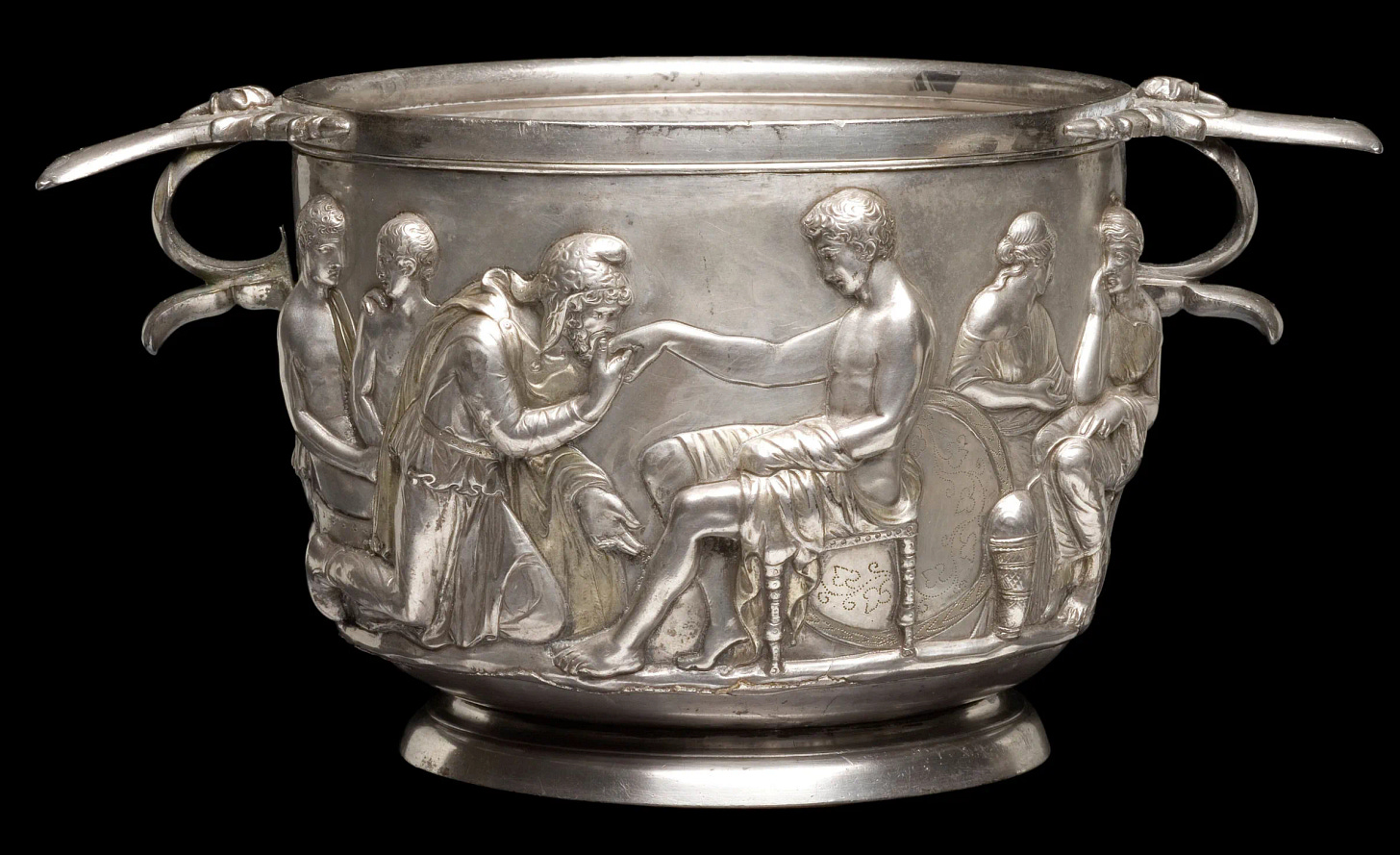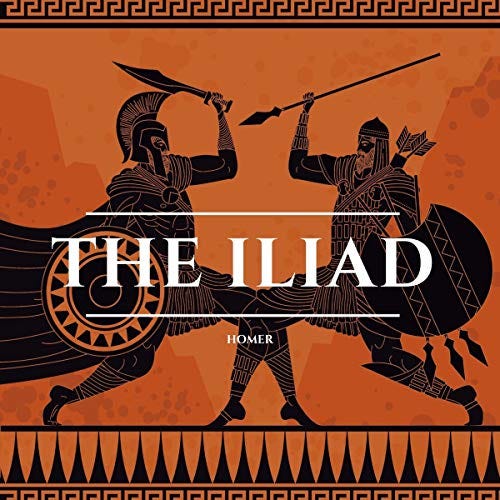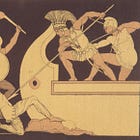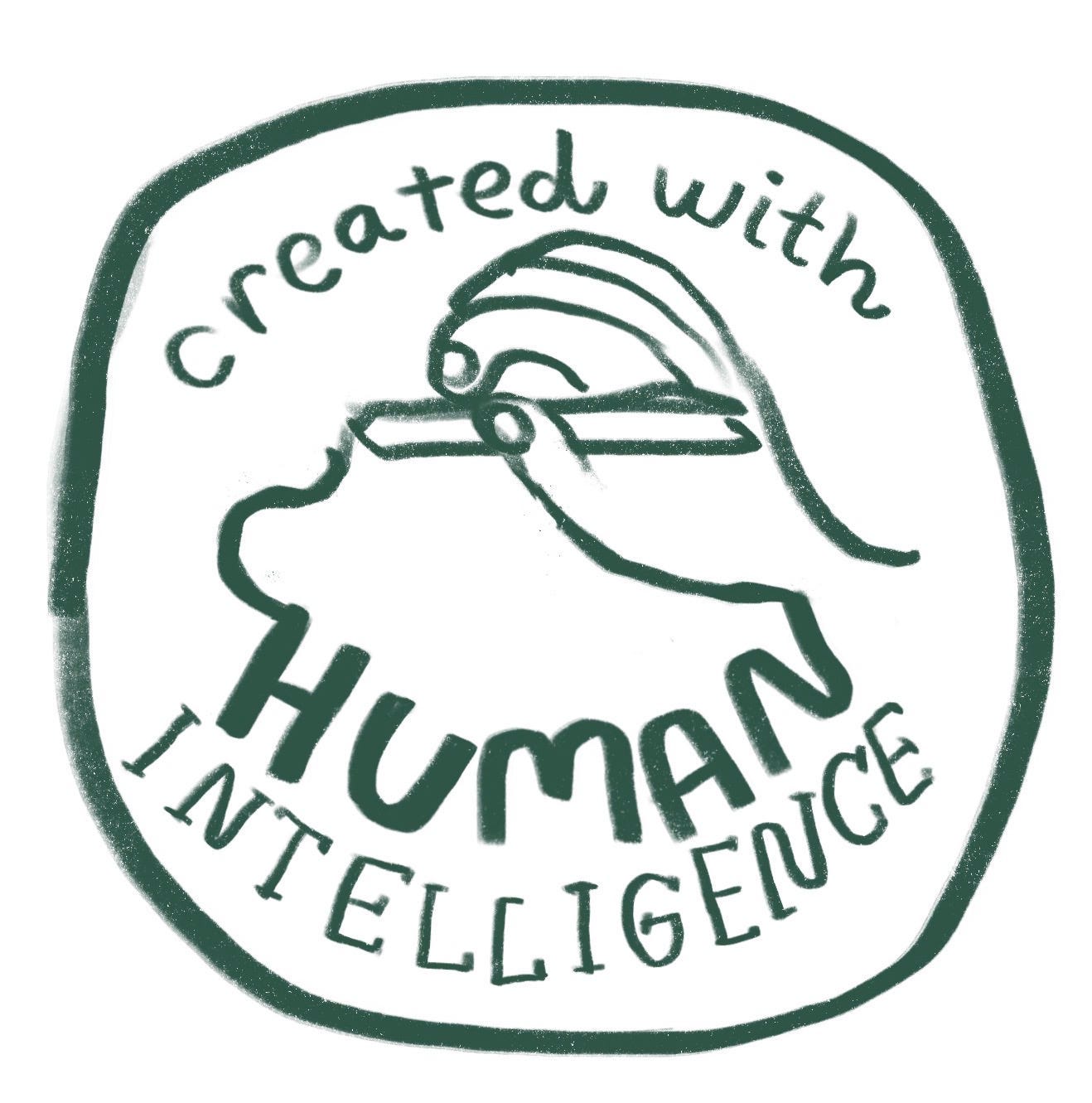Achilles and Priam
The Iliad Book 24
Exploring Life through the Written Word
“Poor man, how much you’ve borne—pain to break the spirit! What daring brought you down to the ships, all alone, to face the glance of the man who killed your sons, so many fine brave sons?”
Dear friends,
Book 24 of The Iliad, is a deeply human and poignant conclusion to Homer’s epic. After the climactic rage and retribution of Book 23, Book 24 brings the narrative to a tender and tragic close. While the broader war narrative remains unresolved—the sack of Troy still distant—this final book offers emotional closure and profound insight into the themes of grief, honor, and reconciliation.

The book opens with Achilles still mourning the death of Patroclus. Though he has honored his friend with funeral games and built him a magnificent pyre, Achilles’ wrath continues unabated. He dishonors Hector's corpse by dragging it around the tomb of Patroclus every day, tethered to his chariot. Yet the gods protect Hector’s body from mutilation, preserving it from decay and damage.
Apollo, outraged by Achilles' desecration, appeals to the other gods to intervene. He argues that Achilles, though a great warrior, has behaved without compassion or restraint, violating the sacred customs of war. Apollo’s speech is persuasive, and Zeus decides that it is time to return Hector’s body to the Trojans. He sends Thetis to speak to her son, urging him to accept ransom from King Priam and to relinquish Hector’s body. Achilles, still consumed by sorrow but moved by divine persuasion, agrees.
Meanwhile, on the Trojan side, Priam is inconsolable. He grieves for his son Hector, the strongest defender of Troy, whose death spells doom for the city. When he hears that the gods have commanded Achilles to return the body, Priam resolves to go to the Greek camp himself. Aided by Hermes, who appears in disguise to lead him safely through the enemy lines, Priam journeys alone under the cover of night. His decision is bold, dangerous, and full of dignity.
In one of the most moving scenes of the Iliad, Priam enters Achilles' tent. Instead of demanding or pleading in anger, he kneels before Achilles and kisses the hands that killed his son. He appeals not to Achilles’ pride, but to his empathy: he reminds Achilles of his own father, Peleus, old and frail and far away, vulnerable without his son. This raw, shared grief forms a powerful emotional connection between them.
Achilles is stunned and deeply moved. The sight of Priam awakens in him a sense of humility and compassion that had been buried under rage. He recalls his own father and weeps. The two men—enemies by circumstance—mourn together, united by their losses. Achilles lifts Priam gently, promises to return Hector’s body, and instructs his servants to prepare it with care.
Achilles hosts Priam in his tent and offers him a meal, showing respect and reverence to the Trojan king. The conversation turns from death to life, from grief to shared humanity. Achilles even grants Priam a truce of twelve days for Hector’s funeral rites, so the Trojans can properly mourn and bury their hero without fear of Greek attack.
The book ends with a solemn and beautifully described funeral for Hector. The Trojans retrieve the body, and Andromache, Hecuba, and Helen each give moving laments. Hector, breaker of horses, is finally laid to rest with honor.

Book 24 of The Iliad is often regarded as one of the most emotionally resonant and philosophically profound portions of the entire epic. After volumes of war, wrath, and divine manipulation, Homer brings the story to a close not with bloodshed, but with an act of mercy. This final book shifts the narrative arc from fury to forgiveness, reminding us that even amidst destruction, humanity endures.
One of the central literary arcs in The Iliad is the transformation of Achilles. From the opening line—“Sing, Muse, the wrath of Achilles…”—Achilles is defined by his rage. It leads to the death of his comrades, the rejection of his commanders, and ultimately the slaughter of Hector in an act of revenge. But in Book 24, Achilles reclaims his humanity. Homer peels back the layers of divine favoritism and heroic rage to show us a grieving man who mourns his friend and feels the absence of his father.
Achilles' interaction with Priam is particularly significant because it marks a moment of self-recognition. Priam’s appeal is powerful not because it is clever, but because it is universal. By asking Achilles to consider the pain of an aging father who has lost his son, Priam collapses the barriers of war. Achilles sees himself reflected in Priam’s grief, and through that recognition, he finds the strength to relent. This is the moment when Achilles transcends his role as a near-immortal warrior and becomes fully human.
Priam’s journey is one of the most courageous acts in The Iliad. It is not a feat of physical strength, but of moral bravery. He enters the enemy camp, unarmed, trusting the gods and the power of humility. His decision is driven not by pride or politics, but by paternal love. Homer presents Priam as the embodiment of royal dignity—aged, broken, yet unwavering. His appeal to Achilles is tactful and genuine. He does not seek vengeance but closure.
Priam’s bravery also serves a narrative purpose: he draws Achilles out of his grief-stricken isolation. Where Agamemnon, Odysseus, and even Patroclus failed to reconcile Achilles to the broader human cause, Priam succeeds. In this way, Priam acts not just as a bereaved father, but as a peacemaker, a figure of moral clarity amidst a sea of war.
One of the most beautiful themes of Book 24 is the portrayal of grief as a shared human experience. War, politics, and divine intervention may divide people, but grief unites them. Achilles and Priam are enemies by birthright and allegiance, but they are both fathers and sons. Homer carefully constructs their dialogue to center on universal emotions—loss, memory, and longing. Their tears are not just for the dead but for the life they can no longer have.
The Iliad does not offer a simplistic resolution to the war; Troy will still fall. But Homer shows us that even in a world governed by fate and fury, there can be moments of grace. Achilles’ change of heart does not end the war, but it brings peace to one grieving father and honors one fallen son.
Another essential aspect of Book 24 is the emphasis on proper burial and funerary rites. The Greeks and Trojans alike viewed burial as a sacred duty—one that ensured the soul's peace and honored the gods. Achilles’ initial desecration of Hector’s corpse is more than just vengeance; it’s a violation of divine and cultural order. His restoration of Hector’s body and agreement to a truce is not only a personal act of mercy but a restoration of cosmic balance.
This concern with funerary rites echoes throughout ancient literature. In Antigone, Sophocles builds an entire tragedy around the right to bury the dead. Homer, too, insists that death, though brutal, must be met with honor. This belief binds communities together and reaffirms the values of respect, ritual, and remembrance.
The relevance of Book 24 in modern life is profound. In a world often fragmented by division—political, racial, religious—the message of shared grief as a bridge toward understanding is deeply resonant. Achilles and Priam teach us that reconciliation requires humility, empathy, and the courage to see oneself in the “enemy.”
Their encounter reminds us that forgiveness is not weakness but strength. In diplomacy, in personal relationships, in public discourse, the ability to move beyond vengeance and seek understanding is vital. Whether in post-conflict communities, restorative justice initiatives, or even interpersonal disputes, the lesson is the same: peace begins with the recognition of shared humanity.
Furthermore, the respect for the dead and the rituals of mourning are universal. In a time where mass loss—from war, disease, or disaster—can seem impersonal, Homer’s emphasis on personal grief and dignified burial underscores the need to honor each life. The funeral of Hector is not just a farewell but an affirmation of value, identity, and memory.
Finally, Achilles' transformation reminds us that identity is not static. People can change. Wrath can give way to wisdom. Even the most hardened hearts can soften in the face of shared pain. This arc mirrors the struggles many face in healing from trauma or learning to forgive. It affirms the possibility of personal growth and moral clarity in even the darkest of circumstances.
Book 24 of The Iliad does not end the war, but it does offer a kind of peace. It shifts the narrative from wrath to reconciliation, from destruction to dignity. Through the profound encounter between Achilles and Priam, Homer provides one of the earliest and most powerful literary meditations on grief, empathy, and the possibility of healing.
In our own time—marked by conflict, division, and loss—the final book of The Iliad offers more than a historical or literary artifact. It offers a guide. It teaches us that in the midst of rage, there can be compassion; that in the face of death, there can be dignity; and that even across the boundaries of blood and war, humanity can prevail.
“And overpowered by memory both men gave way to grief. Priam wept freely for man-killing Hector, huddled at Achilles’ feet as Achilles wept himself… remembering his father, now, and his comrade, lost.”
The Iliad and the Arc of Glory: A Book Club’s Journey through Homer’s Epic
For the past six months, our book club has journeyed through the bronze-clad world of Homer’s The Iliad, one book at a time, one week at a time. In doing so, we entered not merely a work of poetry, but a world where honor is currency, gods walk beside mortals, and the line between glory and grief is as thin as a blade’s edge. As we closed the final page, we found ourselves not only enriched by the story of Achilles, Hector, and Priam, but transformed by the poem’s timeless meditations on fate, rage, heroism, and the sacred cost of war.
Now we reflect on that journey. We trace the arc of the Greek hero as Homer presents him—flawed, passionate, and godlike in his singularity. We examine the roles of the Olympians, whose divine whims and allegiances shape the human drama below. And finally, we place The Iliad within the grand tradition of literary history, considering why, after nearly three millennia, it still holds such urgent power.
From the very first word—menin, “rage”—we are thrust into the intimate and dangerous psychology of the Greek hero. Achilles, the “best of the Achaeans,” becomes our lens through which heroism, wrath, and mortality are explored. As a club, we found ourselves circling back to the question: What does it mean to be heroic in Homer’s world?
In Book 1, we see Achilles insulted and dishonored by Agamemnon, his rage flaring not only from wounded pride but from a deeper moral affront. This rage becomes the engine of the poem, casting its shadow over the fate of both Greeks and Trojans. And yet Achilles is not a simplistic figure of anger. As the poem unfolds, we come to understand his complexity: his loyalty to Patroclus, his refusal to fight for a king he deems unjust, and eventually, his vulnerability and capacity for grief.
The Greek hero, we discovered, is not measured by his morality in the modern sense. He is a being of kleos—glory won through deeds that will echo through time. This pursuit of immortal fame leads Hector, too, to face Achilles, even though he knows the battle is unwinnable. Hector, whom many in our group saw as the poem’s moral center, fights not just for glory but for his wife Andromache, his son Astyanax, and his doomed city.
And yet, heroism is not without cost. In Book 16, the death of Patroclus shifts the emotional current. When Achilles returns to battle in Book 19, he does so not in triumph, but as a man hollowed out by loss. His duel with Hector in Book 22, brutal and merciless, is a crescendo of fury and fate. And yet the poem’s arc bends not to more violence, but to compassion. In Book 24, Priam kneels before Achilles and kisses the hands that killed his son. Achilles weeps not only for Patroclus, but for Peleus, for himself, and for the sorrow at the heart of human life. It was this moment—of shared mourning between enemies—that many of us found the most profound. The Greek hero begins as a man seeking eternal fame; he ends as a man who has touched, however briefly, the depths of humanity.
If the heroes of The Iliad are monumental, the gods are no less dynamic. As we progressed through the weeks, we came to understand the Greek Pantheon not as a fixed system of remote deities but as an extension of the poem’s emotional and ethical drama.
Homer’s gods are not omniscient beings. They have favorites, they quarrel, and they intervene not from justice but from passion, spite, and loyalty. Hera supports the Achaeans; Aphrodite defends Paris and the Trojans; Zeus, bound by fate but pulled by sentiment, seeks balance but cannot always achieve it. The gods do not dictate outcomes so much as they mirror human emotions on a cosmic scale.
In Books 4 through 8, divine intervention is frequent and dramatic. We debated whether this was a reflection of ancient fatalism or a narrative device that allowed Homer to heighten tension. Apollo’s plague, Athena’s deception, and Zeus’ manipulation of fate are not signs of divine wisdom but expressions of power entangled with personality. The gods use mortals as chess pieces, but they too are subject to the broader forces of destiny.
Yet the gods also provide ironic commentary on the human condition. In Book 5, Diomedes wounds both Aphrodite and Ares, a mortal drawing blood from immortals. In Book 21, Achilles fights the river god Scamander—a symbol of nature rebelling against unchecked rage. These moments show the tension between human ambition and cosmic order.
Perhaps the most telling moment comes in Book 16, when Zeus hesitates before letting Sarpedon die. He loves his son but knows he must let him fall, for even gods must respect fate. This tension between divine power and human mortality was a frequent subject of our discussions. Are the gods in control, or merely participants in a system larger than themselves? In Homer’s world, it seems, even the immortals are constrained.
No discussion of The Iliad would be complete without recognizing its monumental place in the history of literature. As a club, we not only read the poem—we inhabited a foundational story that shaped much of Western narrative tradition.
The Iliad is a war poem that does not glorify war. It is an epic that begins not with origins, but with wrath. It ends not with triumph, but with burial. In doing so, Homer set a precedent for tragedy, moral complexity, and poetic ambition. Before there was Shakespeare or Tolstoy, there was Homer—channeling the chaos of life into verse.
Its influence is impossible to overstate. The poem is a source text not just for Greek drama and philosophy, but for the entire Western literary canon. The idea of the tragic hero, of glory bound to grief, finds echoes in works from Macbeth to Moby-Dick. The structure of the epic—its invocation of the Muse, its similes, its use of epithets—became literary tools for centuries. Even the concept of storytelling as a way to preserve memory, to defy time, originates here.
And yet The Iliad is more than a relic. Its language pulses with life. We marveled at Homer’s poetic similes, his capacity to stop a battle mid-charge to compare a warrior to a falcon, a lion, or a storm. His voice is grand, but never impersonal. His characters bleed, love, rage, and mourn with a vividness that feels startlingly modern.
In our modern world, where war is both distant and immediate, and heroism is often complicated by cynicism, The Iliad remains essential. It asks questions we still ask: What does it mean to be great? How do we mourn the dead? Can rage be justified? Can enemies ever recognize each other’s humanity?
Reading The Iliad one book per week offered us a rhythm that mirrored the poem’s own pacing—episodic, yet sweeping. Each week brought new challenges, characters, and conversations. Some of us wrestled with the dense war catalogs of Books 2 and 11; others found unexpected beauty in the grief-laden laments of Books 6, 22, and 24.
What emerged over time was not just knowledge, but intimacy—with the text, with the characters, and with each other. We charted the arc of Achilles’ transformation, traced Hector’s doomed sense of duty, and lamented the fall of Patroclus. We debated Agamemnon’s leadership, sympathized with Andromache, and pondered the strange tenderness of Helen.
We also found that the poem spoke to our lives. Some of us saw reflections of military service, familial duty, or personal grief. The poem’s brutal honesty about death, legacy, and love resonated in ways we hadn’t expected. In Achilles’ rage, we saw the dangers of unchecked emotion; in Priam’s humility, the possibility of reconciliation.
By the time we reached Book 24, we realized that The Iliad is not simply about war—it is about what war reveals. Homer shows us the world not as it should be, but as it is: violent, beautiful, brief. And in doing so, he invites us to search for meaning in the spaces between destruction and compassion.
To finish The Iliad is not to leave it behind. Like Achilles dragging Hector’s body, the poem lingers, demanding to be remembered. And yet unlike Achilles, we are changed not by vengeance, but by understanding.
We began our journey expecting a tale of battle; we ended with a meditation on sorrow. We met gods and heroes; we left with questions about ourselves. For some of us, this was a return to a beloved classic; for others, an initiation into the world of ancient epic. But for all of us, the experience was transformative.
The Greek hero taught us that greatness is inseparable from loss. The gods reminded us that power is never simple. And Homer’s voice carried across centuries to remind us that poetry is not escape—it is a reckoning. In the end, The Iliad is not only a story about a war that occurred long ago on the windy plains of Troy. It is about what it means to be human, to suffer, to choose, and to remember.
Reading Assignment for Next Week
Next week we will have a break with no reading or essay. We will have our opening essay on The Odyssey on July 4th. If you would like to read the introduction, it is on pages 3-74 of the Fagles translation. This is optional reading, so don’t feel compelled to read it.
Beyond the Bookshelf is a reader-supported publication. Becoming a paid subscriber is the single most impactful way you can support the mission of exploring the connection between life and literature here at Beyond the Bookshelf. An annual subscription is only $12/year.
If you can’t commit to a paid subscription at this time but would still like to support my work, please visit my support page for a list of other ways you can help keep the lights on.
Until next time,
Previous articles in this series:
If you are a new subscriber or missed any of the previous articles in this series, you can catch up at the link below:
All opinions in this essay are my own unless otherwise noted. Additionally, I have highlighted all sources in the text if needed.








Wow what a journey - I finished the last 3 books a few weeks ago before a busy time at work. The last book is like a breath of fresh air after all the carnage - fewer feckless gods and more bare vulnerable humanity. For a modern exploration of book 24 also check out Ransom by David Malouf.
Look forward to embarking on the Odyssey.
I am so glad I found this group to go through The Iliad together! Matthew, your wrap up with each book was wonderful as it helped tie the books together in my mind. Thank you for all of the work you have put into this. I am so ready for The Odyssey!